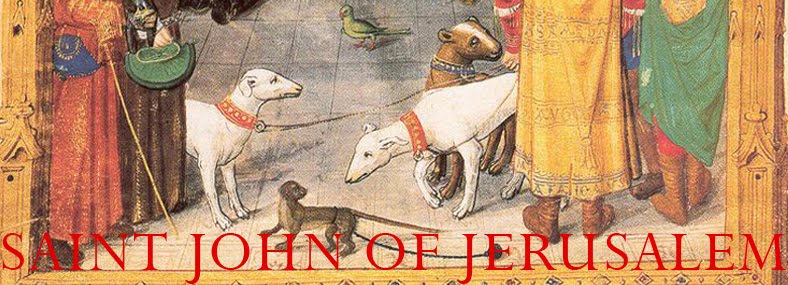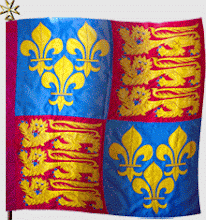DR CONLON'S HOMILY FOR THE VICTORY MASS
We are pleased to be able to reproduce here the homily preached at the Victory Mass last Friday, and express our gratitude to Dr Antony Conlon, Chaplain of the Grand Priory, for celebrating the Mass and for preaching.
In
the long history of the progress of human ideas misunderstanding of interaction
and integration of the spiritual and the physical has been a major problem. A major
heresy known as dualism hindered the spread of Christianity from the beginning
and has continued in various forms to afflict religious experience to this day.
Dualism may be described as a radical scepticism and disapproval regarding all
things physical and material. This would include obviously the visible and
tangible creation, the body and all its attributes, human organisations and
objects fabricated or designed by human effort. Essentially, matter is evil and
only spiritual things are good. One extreme form of dualism denies outright any
possibility of good coming from or being associated with the body and bodily or
man-made institutions or things.
Another form of it, hostile to reason, urges
concentration entirely on the realm of spiritual intensity regardless of
historical investigation, or without the need for any intellectual religious
content or doctrine. Yet another consequence of dualism is the notion that
since all bodily aspects are incapable of virtue or sanctification bodily actions
are simply relative to the instinct or feelings of the person with no objective
standard by which they may be judged. All religions are susceptible to a greater
or lesser extent to devaluing matter in order to emphasize the superiority of
the spiritual. Some are entirely biased
in the direction of an extreme view of the physical related to some form of
dualism. Over the centuries the Church has had to contend with heresies linked
to it and on several occasions laboured to preach against dualistic tendencies and
to pronounce formally on such issues. The Reformation story is littered with
examples of a defective understanding of human nature and the use of material
things to mediate spiritual effects.
Hostility and iconoclasm towards relics, images, icons and statues, are
a consequence of this same prejudice. Some otherwise sane Catholics are afflicted by
similar hang-ups.
The
Old Testament is prohibitive of the use of images. This is related to the fear
of imitation of their widespread use by the surrounding pagan cultures. But from
the very beginning revealed religion clearly understood the harmony of visible
and invisible world intended by the Creator. Everything made by God is good
(Gen. 1). It is the misuse of material things and wilful disobedience of the
laws of nature that corrupts and spoils the beauty of creation. Man is the
highest level of earthly creation but animals and the fruits of the earth are
legitimate offerings in the worship due to God alone. By various covenants God led and guided His
chosen people to unite a code of behaviour linked to rituals involving animals
and precious resources with an internal disposition to adoration and so seek to
promote the recovery and preservation of that harmony disrupted by sin and
rebellion. But these were only stages and signposts in the long and sometimes
fragmented process that would lead to the ultimate joining together of the limited
and fractured material and visible world and that of the invisible and
immaterial realm of pure spirit and indestructible form. This and its immediate
historic consequences is the story that the New Testament unfolds. The power
and the nature of the divine breaks down the barriers of millennia of human folly
and wickedness and offer a way to the restoration of integrity of body and
spirit and a superior union with the divine. The Old Testament distance related
to physical inadequacy and material inferiority is bridged by a renewal of the
covenant, this time sealed not by the blood of animal sacrifice but by One who
combined in himself the nature of a perfect man and the identity of divine
personhood. There should be no more ambiguity or uncertainty about human
dignity and worth because God had committed himself to remedy humanity’s
defects through a total identification with flawed material creation and
overcome through obedient acceptance of it, the consequences of human sin and
weakness, namely, suffering and death.
This
covenant, like all the others, required human cooperation. God looked for and
found it in Mary, a daughter of Adam and a descendant of Abraham. He prepared
the way by preserving her in advance from any taint of sin and left her free to
accept his invitation. In every account of biblical initiative we shall find
that same principle of freedom being honoured when agents of divine cooperation
are sought by God. He both respects and engages our human freedom as an
essential element supported by his grace. The earliest Christian interpreters
of the Gospel tradition recognised in Mary’s birth the first stage and
inauguration of salvation. From that day onward the process was in place for
all that followed. Christians down through the centuries, learning from and
relying upon these primitive inspirations of the Holy Spirit at work in the
Church evolved a rich tradition of Marian piety which our ancestors inherited
and for which some of them suffered death, discrimination and denial of civil
rights.
Our
Order, born of the intercontinental challenges that faced Christianity society
and politics a thousand years ago, maintained that tradition of love and
loyalty to the Virgin that is still the badge of true Catholic and orthodox
identity. Today, we continue it. Mary is the chosen human agent of divine mercy,
salvation and the integral coexistence of the spiritual with the material
world. She gave human and physical identity to the historic figure of Jesus of
Nazareth. God, in human form made direct immediate contact with a body that was
subject to nature’s limitations and with things and emotions that are purely
human. But by a gracious action of divine providence, through the divine
Motherhood of Mary God dignified and exalted every aspect of earthly existence and
erased every element of degradation to which humanity is heir. Without Mary
none of this could have happened. Belief in Mary’s divine Motherhood and the
full humanity of Christ that she also guarantees are touchstones of genuine
Christianity. We are heirs to a tradition of faith that rejects the view that
the human body and the material world are incapable of transformation and ultimate
perfection. Though flawed, everything is capable of redemption and
purification.
The powerful opposition to
Christianity’s challenge to the correction of human and material error and
misdeed and the forces with which it must contend have not diminished. Continually
fuelled by ignorance, falsehood and in some cases failure to address it
sufficiently it is unlikely that they ever will. But victory, as in the past is
not gained by superior forces but by resolute courage, fervour and fidelity. The
intercession of Our Lady is a non-negotiable element in our favour. That is the
lesson as well as the precept of today’s celebration.
Category (click to see all related):
Faith,
Saints of the Order












